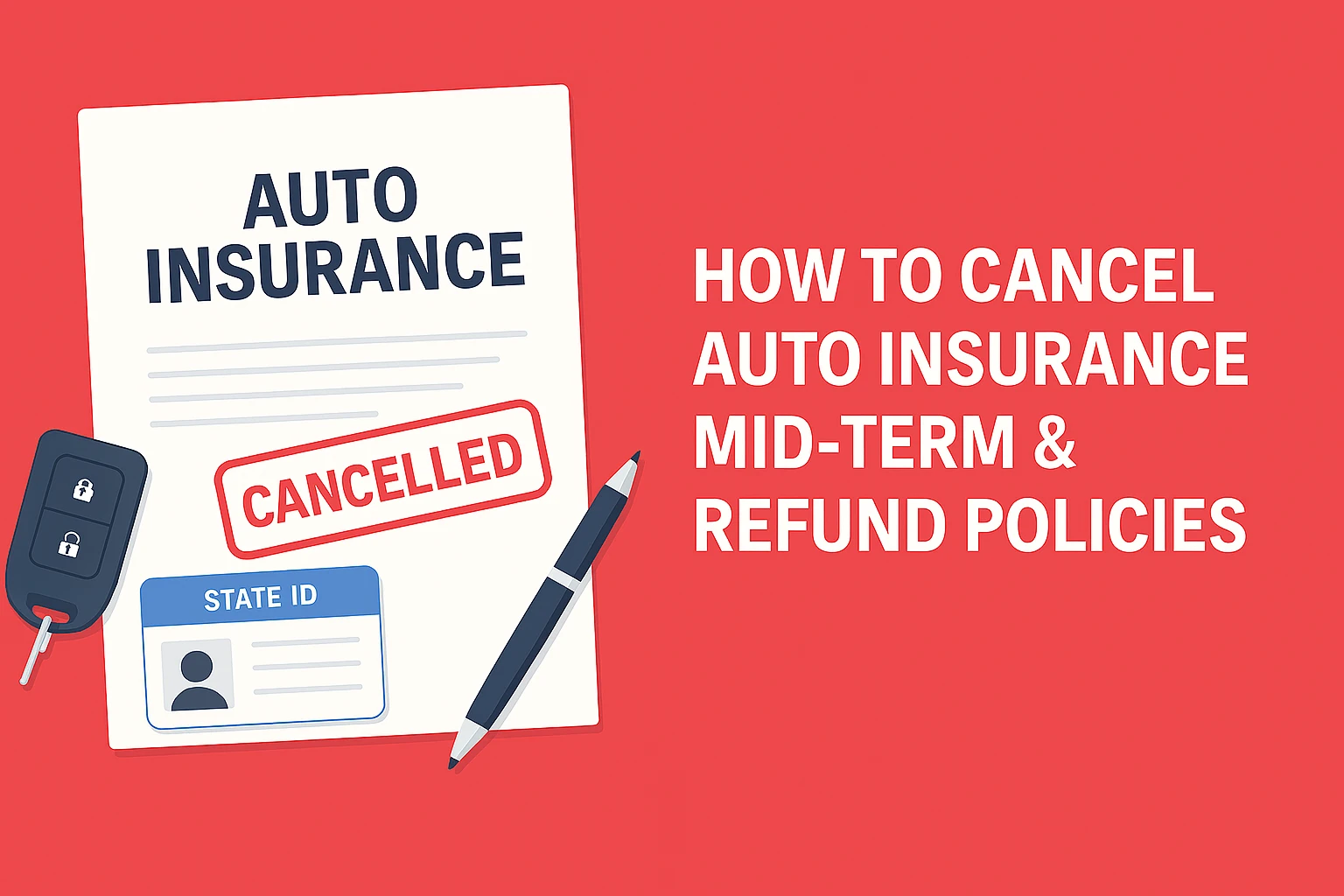Introduction
Life changes quickly—maybe you sold your car, found a better insurance deal, or moved to a state where you don’t need the same level of coverage. Whatever the reason, sometimes drivers in the U.S. want to cancel their auto insurance before the policy term ends. But how does mid-term cancellation actually work? Will you get your money back? And are there risks you should watch out for?
This article explains everything you need to know about canceling auto insurance mid-term, including the process, possible fees, refund policies, and tips to avoid coverage gaps.
Can You Cancel Auto Insurance Mid-Term?
Yes, U.S. policyholders have the right to cancel auto insurance at any point—even in the middle of the policy term. Insurance companies cannot force you to keep a policy if you no longer need it. However, the financial outcome depends on your insurer’s cancellation and refund rules.
For example, if you prepaid for a six-month policy but decide to cancel after three months, you may receive a prorated refund. On the other hand, some companies apply short-rate penalties, which slightly reduce the refund amount.
Common Reasons People Cancel Mid-Term
- Selling a car: If you no longer own the vehicle, you may not need coverage.
- Switching insurers: Many drivers find lower premiums or better benefits elsewhere.
- Moving states: Different states have different insurance requirements.
- Car in long-term storage: Some people store classic or seasonal vehicles and prefer to pause coverage.
- Financial reasons: Budget concerns may push policyholders to explore cheaper options.
Example: John in Texas sold his truck mid-term. Instead of letting the unused three months of coverage go to waste, he canceled the policy and received a prorated refund.
How to Cancel Auto Insurance Mid-Term
1. Review Your Policy
The first step is checking your policy’s cancellation clause. Every insurer outlines how refunds are handled and whether cancellation fees apply.
2. Contact Your Insurance Provider
Call your insurer directly rather than assuming cancellation will be automatic. Some carriers require a written notice or signed cancellation form.
3. Provide Necessary Information
You may need to share details like your policy number, effective cancellation date, and proof of replacement coverage (if switching).
4. Avoid Coverage Gaps
If you’re switching companies, ensure your new policy starts before the old one ends. Even a one-day lapse could trigger state penalties or increase future premiums.
Refund Policies Explained
Pro-Rata Refunds
Most U.S. insurers follow a pro-rata system. This means you get back the unused portion of your premium without penalty.
Example: If you paid $1,200 for a 12-month policy but cancel after 6 months, you’d typically receive about $600 back.
Short-Rate Refunds
Some insurers deduct a small penalty (usually 10% of the unused premium). This discourages mid-term cancellations.
Example: If you cancel halfway through a $1,200 policy, instead of $600, you might get around $540 back.
No Refund Situations
In rare cases—like canceling after filing a claim—insurers may deny refunds. Always confirm before requesting cancellation.
What to Watch Out For
- Lender requirements: If your car is financed or leased, lenders usually require continuous insurance. Canceling early without proof of new coverage can result in loan default.
- State laws: Some states require proof of continuous insurance. A gap could lead to fines or license suspension.
- Discount loss: Canceling mid-term may affect loyalty discounts with your insurer.
Alternatives to Full Cancellation
Sometimes, instead of canceling, it may be smarter to:
- Reduce coverage (e.g., dropping collision on an older car).
- Switch to storage insurance if the vehicle isn’t being driven.
- Update mileage to reflect reduced driving habits.
These options can save money while maintaining protection.
FAQs
1) Can I cancel my auto insurance anytime?
Yes, you can cancel at any time in the U.S., but fees and refund rules vary by insurer.
2) Do I get a full refund if I cancel early?
Not always. Many companies give prorated refunds, but some apply short-rate penalties.
3) Will canceling hurt my credit?
No, canceling insurance does not affect your credit score. However, a lapse in coverage can raise future premiums.
4) Can my insurer cancel my policy mid-term?
Yes, but only under specific conditions like non-payment, license suspension, or misrepresentation.
Conclusion
Canceling auto insurance mid-term in the U.S. is absolutely possible, but it requires careful planning. Always review your policy’s cancellation terms, avoid lapses in coverage, and understand how refund policies—prorated or short-rate—apply to you.
If you’re canceling because of cost, explore whether reducing coverage or switching to another insurer might be better than outright cancellation. By being proactive, you’ll save money, protect your driving record, and ensure you’re never caught without coverage when you need it most.
